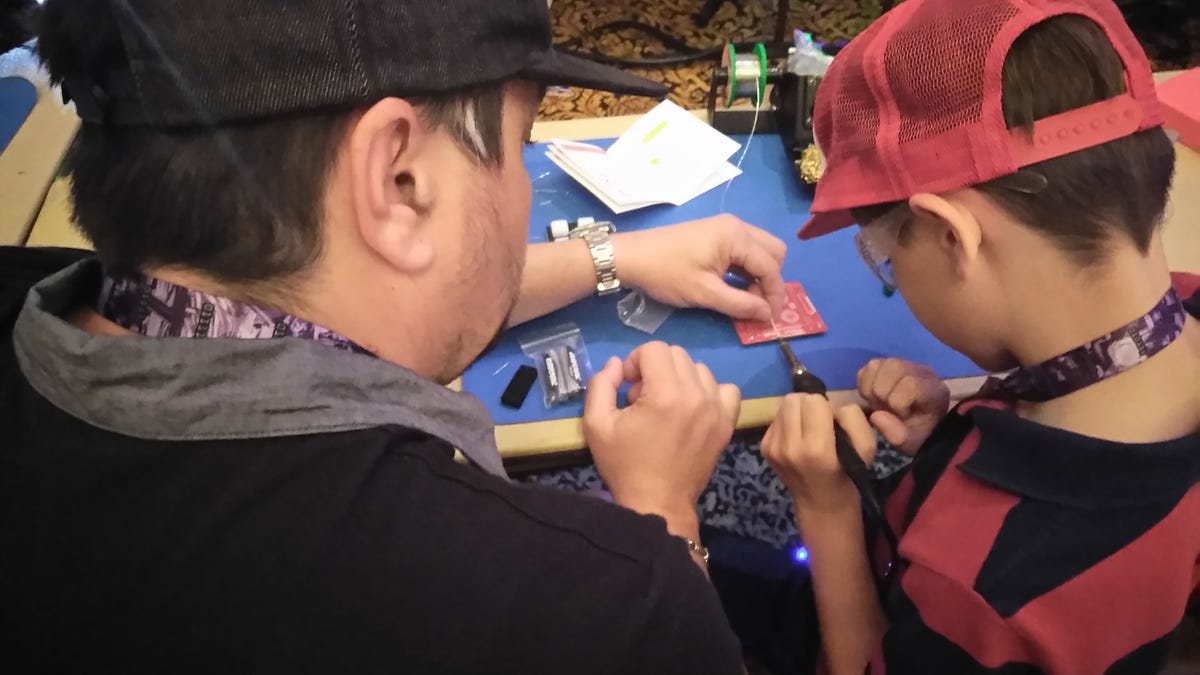Don't baby these kid hackers
Defcon event puts children's hacking skills front and center.

Emmett Brewer is no taller than the lectern on the stage, so he stands to the side of it to deliver his presentation. He's got a Dennis the Menace hairdo and he's only 10 years old, but I strongly suggest you take him seriously.
The topic of his speech today: hacking competitions. He's showing other kids here how to run a capture the flag competition so their friends can learn new skills and trade secrets of how to bend software to their small but mighty wills.
That's right, I'm in a room full of kid hackers. They range from the tiny to high school aged, and they want to learn how to break all the things.
"I like hacking, sniffing, jailbreaking, fuzzing -- all that stuff," Emmett tells the room.
This is r00tz Asylum, a kid-centric event at the annual Defcon hacking event in Las Vegas. It started as a place for kids to hang out with parents instead of at the more mature talks going on down the hall, and over six years it has grown into a full-fledged hacking convention for kids.
In a ballroom at the Paris Resort, kids sit at tables on two sides of the room learning to pick locks and solder circuit boards. In another corner, a hacking competition like the one Emmett described in his talk is taking place. And on the stage, speakers talk frankly about the fun -- and risks -- of hacking.
"Do you want to do more lock picking?" asks a woman leading a tired-looking kindergarten-age boy.
"No," he says vaguely and wanders off to the part of room where the soldering is happening.
Hacking for the future
The conference this year involves the most presentations ever given by kids, including Emmett's. His dad, Joel Brewer, got him interested in learning how to set up a hacking competition called capture the flag using a ready-to-use platform designed by Facebook.
Emmett Brewer explains how to use a platform created by Facebook for designing hacking competitions at the r00tz Asylum kids' hacking event in Las Vegas.
"It was kind of exciting, but I was a little nervous," Emmett, who is starting the fourth grade in Austin this fall, says after giving his talk. Asked if he has any favorite subjects at school other than the computer lab, he says, "Nothing besides computer lab and recess." Now, he's soldering together a circuit board that will eventually become an electronic game of Simon Says.
Facebook made its capture the flag platform open to the public this May. There was too much demand for it from schools and other child-focused organization for the company's engineers to keep up with, said Javier Marcos, who as a Facebook cybersecurity specialist helped develop the competition platform but now works at Uber.
If you're wondering why schools are teaching kids to hack and think these kids are future criminals, you've got it backward. Sure, young people do get in trouble for illegal hacking, but Facebook hopes it's helping to train the cybersecurity experts of the future.
"We started running these CTF competitions as a way to find candidates," Marcos said. Now in addition to urging universities to host the competitions, they've helped a group of high school kids from Utah and Idaho put on the r00tz Asylum capture the flag using their platform.
Passion for cybersecurity
This was a huge opportunity for Connor Jones, a 14-year-old who starts the ninth grade in Saratoga Springs, Utah, this fall. When he first talked with organizers from Facebook on the phone, he couldn't believe it.
"Facebook is on the phone, and I'm like freaking out," he says. "It was really cool."
He and the other students involved with the project worked for the first half of their summer vacation coming up with the hacking challenges that made up the game. Connor loved every second of it, waking up at 8 a.m. every day and sitting in a rocking chair in his basement working on the different parts of the competition.
He thinks he'll work in cybersecurity going forward. "I want to get out there and learn new things every day," he said.
Making a difference
After the children's speeches are over, cybersecurity expert Dan Kaminsky takes the stage. Just four days earlier, Kaminsky gave the keynote speech to a vast ballroom full of adult cybersecurity experts at the Black Hat conference, another cybersecurity event that traditionally takes place in Las Vegas just before Defcon. Now, he's facing a tough crowd of squirmy kids.
"Go ahead, break stuff," he tells the room. "That's how I got where I am."
But, he says, that's not all there is to hacking. Software affects people everywhere in the world now, so what they do next after finding problems in computer code matters.
"You're going to be able to make things better," he concludes. He's almost drowned out by the buzz of happy children picking locks, soldering circuit boards and hacking software.
Corrected 5:30 p.m. PST to clarify that kids aren't left unattended at the r00tz Asylum conference, and that there have been presentations from kids at the conference in the past.

